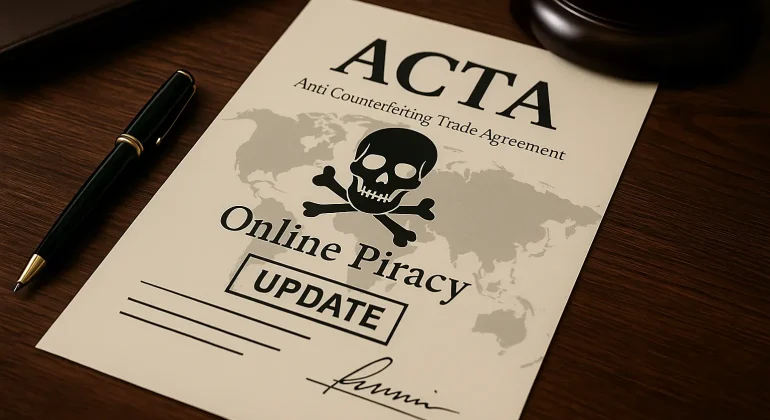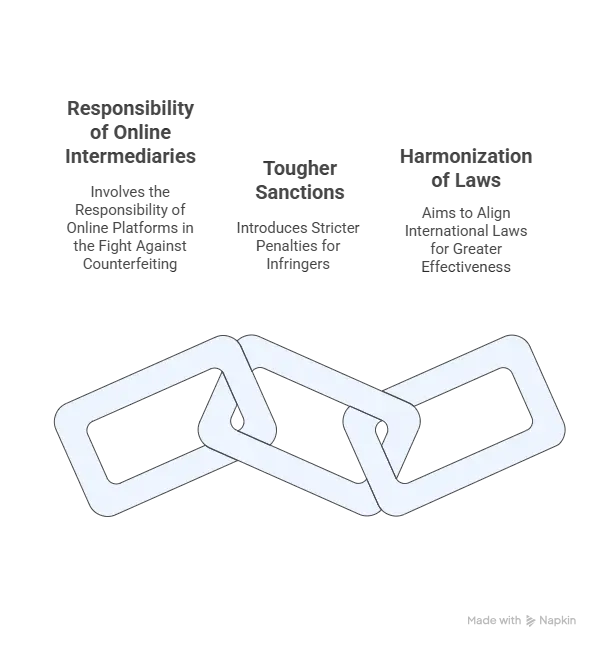Sommaire
Introduction
The Anti-Counterfeiting Trade Agreement (ACTA) is an international treaty that has sparked numerous debates and concerns since its creation. The update to this agreement introduces significant changes affecting the intellectual property field, particularly in the fight against counterfeiting and online piracy. This article explores the recent developments of ACTA, its objectives, and the reactions from the various stakeholders involved.
What is ACTA?
The Anti-Counterfeiting Trade Agreement (ACTA) is an international treaty aimed at strengthening the protection of intellectual property rights. It was designed to fight counterfeiting, piracy, and other forms of copyright infringement, both in the physical and digital world. This treaty was signed by several countries, but its implementation was hindered by concerns regarding privacy protection and individual freedoms.
Why is this article relevant?
The ACTA comes in a global context where counterfeiting and online piracy are on the rise. Moreover, technological advancements and new digital challenges make it even more crucial to strengthen international rules concerning intellectual property. This update is therefore relevant for all businesses and content creators, as it changes the way intellectual property will be protected globally.
Objectives of the updated ACTA
The primary modifications to ACTA aim to enhance international cooperation in the fight against counterfeiting, especially on the Internet. These include strict measures regarding the responsibility of online intermediaries, as well as harsher penalties for counterfeiters. ACTA also seeks to harmonize the laws of different countries for more effective combat against digital piracy.
Stakeholders of ACTA
ACTA involves several key actors, including the governments of the signatory countries (Japan, the United States, Canada, New Zealand, Morocco, South Korea, Singapore, and Australia), businesses from the digital industry, copyright defense organizations, and end-users. The stakeholders are primarily businesses with intellectual property rights to protect, such as those in the fashion, media, and music sectors. Civil society also plays an important role, particularly in monitoring the impact of the proposed measures on individual freedoms and privacy protection.
Concerns raised by ACTA
Despite its laudable goals, ACTA raises concerns, particularly regarding the protection of human rights and privacy. Some opponents of ACTA argue that the proposed measures could lead to abuses, such as excessive surveillance of internet users or unjust actions against innocent users. Critics have highlighted the lack of transparency in the negotiations and the risk of excessive global governance in the digital domain.
The European Commission’s position
The European Commission initially supported ACTA but changed its position after negative reactions from civil society and European governments. It decided to suspend its signature of ACTA, citing the need for greater clarity and guarantees concerning the protection of fundamental rights of European citizens. The Commission’s current position is to reassess the impact of ACTA on human rights before any reintroduction into European legislation.
The Obsolescence of ACTA and the Emergence of New Mechanisms to Combat Counterfeiting
ACTA (Anti-Counterfeiting Trade Agreement), although initially signed in 2011 by several countries, is no longer in use today. The agreement was widely contested and failed to gain universal ratification, notably due to its rejection by the European Parliament in 2012. Since then, ACTA has not been implemented and is considered obsolete in the context of international counterfeiting regulation. Today, the fight against counterfeiting is governed by other legal instruments, including agreements from the World Trade Organization (WTO), such as the Agreement on Trade-Related Aspects of Intellectual Property Rights (TRIPS), as well as national legislations and trademark and patent protection systems. Furthermore, mechanisms like the European Directive on the Enforcement of Intellectual Property Rights (Directive 2004/48/EC) effectively address counterfeiting issues within the European Union. Thus, while ACTA had an influence on the initial discussions, other legal tools and international agreements have taken over to ensure the protection of intellectual property rights.
Conclusion
In conclusion, the update to ACTA represented an important step in the fight against counterfeiting and digital piracy worldwide. However, it raises legitimate concerns regarding the protection of individual rights.
Dreyfus Law firm assists its clients in managing complex intellectual property cases, offering personalized advice and comprehensive operational support for the complete protection of intellectual property.
Dreyfus Law firm is partnered with a global network of lawyers specializing in intellectual property.
Nathalie Dreyfus with the assistance of the entire Dreyfus team.
FAQ
1. What is ACTA?
ACTA is an international trade agreement aimed at strengthening the enforcement of intellectual property rights and combating counterfeiting and piracy.
2. Who are the main signatories of ACTA?
The main signatories of ACTA include countries like the United States, Japan, the European Union, and other developed nations.
3. What is the primary goal of ACTA?
The primary goal of ACTA is to promote the harmonization of international rules for better combatting counterfeiting and piracy.
4. Does ACTA affect the rights of European citizens?
No, according to the European Commission, ACTA does not change the rights of European citizens but harmonizes the enforcement rules for intellectual property.
5. What is the next important event regarding ACTA?
The next round of negotiations on ACTA is scheduled for June 2010.


